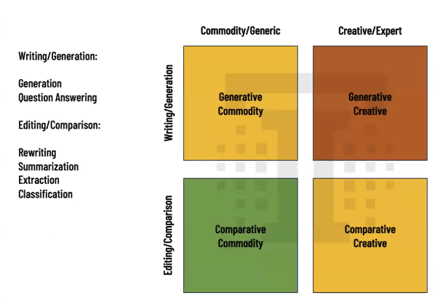Inbound Marketing Blog
for Manufacturers and Healthcare Companies
AI IN MARKETING | THE INS AND OUTS OF GENERATIVE AI

We all have that tech-wiz colleague – whom we can all be jealous of. What if there was an easy way you could become this person?
Generative AI in marketing is up-and-coming and will become the head of operations for businesses. Although AI is not replacing us, it will disrupt the future of work. In fact, it already is. That’s why the time for AI education is now. A marketer who is skilled at AI will take the job of a marketer who is not. There’s still time to keep up with the trends.
Protocol 80, Inc. is attending AI for Content Creators, the webinar series hosted by MarketingProfs. The second session, What Content Creators Need to Know About Generative AI, was presented by Christopher Penn, Co-Founder and Chief Data Scientist at Trust Insights. The topic of the session is generative AI with a focus on large language models. Now, to break down the specifics of this session.
What Is Generative AI In Marketing?
In a broad sense, AI is a tool that performs various tasks and functions. So, what is generative artificial intelligence? Generative AI gets more specific in what it does. In marketing, generative AI is used to perform specific tasks, such as producing images, text, audio, and data.
There are many things to note when starting with AI, which range from the various use cases to best practices for prompt writing. Having this knowledge will help you understand how AI works, the opportunities it presents, and the role of AI in B2B marketing.
Prompts & Prompting
A prompt is the starter sentence – or command – you provide an AI—the more specific the prompt, the better the response. If you give a prompt very few words, the AI will assemble a generic response, one you’ll likely (and probably should) delete.
If your responses don’t turn out the way you want, here are three tips to receive a better outcome:
- Utilize a structured prompt layout
- Tell the AI to evaluate the response
- Ask the AI to summarize the work (after every 2-3 pages)
6 Use Cases of Generative AI
There are various benefits of AI in digital marketing. Many are obvious. Others - not so much. The six AI prompt cases explain what these tools do:
1. Generation: Generate a promptExample: You will act as a B2B marketer. Write a blog post about AI.
2. Extraction: Enter data into a prompt to get more data outExample: Act as an SEO expert. Read this page and develop a list of 20 SEO keywords.
3. Summarization: Summarize a response/textExample: Synthesize a mission statement from the comments provided.
4. Rewriting: Rewrite a response/textExample: Rewrite this email in a professional tone using best practices.
5. Classification: Classify a response/textExample: List 3 topics this article could be classified as in a marketing automation system.
6. Question Answering: Answer a questionExample: What are the advantages of digital marketing over traditional marketing?
When Should You Use Generative AI?
You may be wondering when to use artificial intelligence versus performing a task manually. Remember: machines are better at editing provided data and making extrapolations; humans are better at writing and the creative. The rule of thumb is if the task falls under the writing category, DIY. If it falls under the editing category, an AI can do it.
There are six general use cases on what AI tools do and how to use them effectively. These cases are tailored to AI content marketing and how AI can assist in content creation and editing:
| Writing: Creating content from scratch 1. Generation 2. Question answering |
Quality control: Editing & comparison 3. Rewriting 4. Summarization 5. Extraction 6. Classification |
When there are multiple tasks at hand, it can become more difficult to decide if an AI or human should complete them. This would be the case for a combination like generation and extraction or question answering and rewriting. Here is an outline to decide when to use AI for simultaneous tasks (see chart for reference):

- Generative Commodity can be performed by AI, e.g. “generate an image”
- Comparative Commodity should be done by AI the vast majority of the time, e.g. “analyze this data”
- Generative Creative should be done by humans, e.g. “finish a sentence”
- Comparative Creative should be done by humans, e.g. “write a press release”
What Is a Large Language Model?
A large language model (LLM) is a machine-learning software that can filter language and context. It’s based on probability: machines can’t read, but they can understand probability.
More specifically, AI can decipher the likelihood of one word appearing next to another. Even with a simple one-word alteration, these sentences have two entirely different meanings:
- “You’re brewing the tea” suggests making a cup of tea.
- “You’re spilling the tea” suggests gossiping.
How do Large Language Models Work?
Artificial intelligence is simply a prediction engine. It uses a probability method to generate a response in 3 steps:
- The AI will take text from various sources such as academic papers and even social media.
- The AI will use this information to compute the probability of one word being next to or near another.
- The AI will predict the likelihood of the next word.
Example: You’re brewing the tea
coffee
beer
kombucha
Limitations/Risks with LLMs
You shouldn’t be using AI for everything. As described previously, some tasks are accomplished more efficiently by humans. Here are a few risks to consider:
- Bias: Gendered names, regional names, and stereotypes can appear in outputs.
- Copyright: If humans do not produce the content, it's ineligible for copyright (as in the case of AI). Rulings vary by location and law.
Example: An AI writes a blog and you make edits. The content written by you can be copyrighted.
- Legislation: It’s coming; be on the lookout!
Scaling the Use of LLMs
We know that LLMs are predictors, but what do they predict? There are four mechanisms for effectively using LLMs:
- Prompt engineering: Prompts can complete various tasks, but there are still considerations when composing prompts:
-
- Never insert confidential information into a prompt. AI can’t ensure that your information will be secure. In June 2023, over 100,000 ChatGPT accounts were hacked and made available to the public.
- Building a prompt library can help you store prompts and their results. A few prompt library resources include:
-
3. Fine-tuning models: A fine-tuned model is tailored to a specific task. Karen the Editor is one AI model that was fined tuned to correct grammar in more sophisticated pieces of writing. Another common use for fine-tuned models is using an AI to evaluate a blog and its articles to identify the author’s tone of voice.
4. App construction: You can use AI to perform complex tasks such as constructing an entire app or novel. This way, anyone, and everyone can be a developer.
AI In Marketing: The Impact
Artificial intelligence will be a major disruptor in marketing for the foreseeable future, One large concern is that AI is drastically affecting search traffic and search engine results. More specifically, an AI might mention your company in a response with no links, making it harder for consumers to directly access your website. Why is this scary? If your traffic is unbranded, your company is at risk of falling off the SEO map.
3 tips for overcoming unbranded AI content marketing:
- Brand is everything -- Build your brand and let it be the focus of your marketing strategy and/or core pillars.
- Directly address your customers (not with AI) -- Text, email, and direct mail are three channels that can help you accomplish this.
- A community (not with AI) -- Discord and Slack are two platforms where consumers can have conversations with a business. Discord is recommended for personas 40 & under, while Slack is recommended for 40 & up.
How to Prepare Your Career for AI
Some companies understand the role of AI in marketing as they are replacing human tasks with AI. This allows employees to accomplish more in their careers than before. Other employers are overestimating using artificial intelligence and getting rid of positions altogether. For example, in May 2023, journalists from the Writers Guild of America went on strike for better pay. Fourteen minutes after they went on strike, it was announced that their jobs would be replaced by AI.
Still, many employers are now recognizing the value of employing both AI and humans. This comes from the understanding that the human touch is imperative for a desired outcome. Companies are taking the initiative to not only educate their employees on AI but encourage them to test out different AI tools.
Looking Forward
| Autonomous AI: Various AI applications working together to complete complex tasks Example: Writing a novel |
Multimodal: Do more than just write text Example: Composing music
|
Ecosystems: Models that do a specific task that you can employ on your hardware Example: Image classification |
| Synthetic marketing: Models that can synthesize marketing Example: AI can duplicate someone’s voice and generate it to say anything (yikes!) |
True creativity: Models make mistakes to come up with original and new ideas Platform: dreamGPT |
Accessible: Everything is accessible to everyone nowadays. You don’t even have to be a graphic designer or coder! Example: Editing images |
There are many LLM and AI-associated technologies in the works. Look out for thee up-and comers in the chart above.
You (Yes, You) Are an AI Developer
Adopting generative AI at your company will not only elevate your marketing but also your technological expertise. With AI, everyone is a developer. Every word is an opportunity -- and the opportunities are endless.
For practice tips on how to use (and not use) AI, visit our massive resource page:
Our Blogs, Direct to Your Inbox!
How to Audit your Online Marketing
If you are executing digital marketing, congratulations! You are most likely already one step ahead of your competition, and making strides to meaningfully connect with prospects online. But, how do you know if you’re seeing continual success year over year, and improving your metrics?
Without the tools in place to analyze and benchmark your efforts, it is impossible to scale your online marketing and ensure continuous success.



